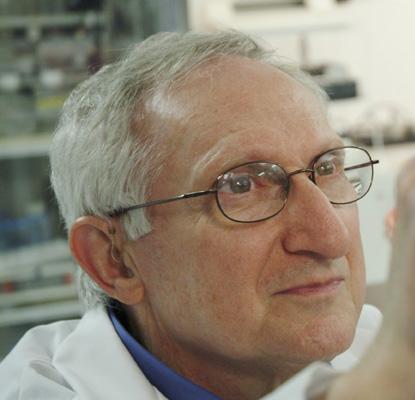Sidney Pestka
Dr. Sidney Pestka is known as the "father of interferon" for his groundbreaking work developing antiviral treatments for chronic hepatitis B and C, multiple sclerosis and cancers. For his tremendous contributions to the biotechnology, chromatography and pharmaceutical industries, and for improving the health of those suffering many serious diseases, he has been named the 2006 winner of the $100,000 Lemelson-MIT Lifetime Achievement Award.
Pestka was born in Poland in 1936 and moved with his family to the United States at a very young age. As a boy, he began inventing instinctively. "It was stimulating to see chemicals change the color of fluids, to construct crystal radios, and to make caramel from sugar—however, my mother’s pots and pans were never the same afterward. It seemed that I constantly thought about new ideas to implement. As a teenager I developed an electronic security key and many other devices, but I did not know about patents at that time."
His parents played a significant role in developing his inquisitive mind. His mother taught him mathematics at a young age, and his father inspired him with his hobby— building bicycles from basic components.
After graduating from medical school, he was an intern in medicine and pediatrics. Afterwards, he worked at the National Institutes of Health (NIH) in the laboratory of Dr. Marshall W. Nirenberg (1968 Nobel Prize in Physiology or Medicine), where he was part of the team working on the genetic code, protein synthesis and ribosome function.
In 1966, Pestka moved to the NIH’s National Cancer Institute to concentrate his research on protein synthesis. Three years later, he left the NIH to go to the Roche Institute of Molecular Biology in Nutley, New Jersey, where he focused on defining how antibiotics work, how proteins are synthesized and, later, how to purify, produce and develop interferons for therapeutic indications. At the Institute, he was the first to purify interferon alpha and beta; to develop reverse phase high-performance liquid chromatography (RP-HPLC) for protein purification; to genetically engineer interferons; and to manufacture interferons for human therapy.
Today, Pestka is chairman of the Department of Molecular Genetics, Microbiology and Immunology at UMDNJ-Robert Wood Johnson Medical School. He is also the chief scientific officer at Pestka Biomedical Laboratories (PBL), which he founded in 1990 to manufacture interferon products, investigate anti-viral compounds, and look for new ways to treat cancers. Pestka’s research is currently focused on interferons and cytokines; receptors and signal transduction; immunotherapy of cancer; and prevention, treatment and control of cancers and viral diseases.
Pestka graduated summa cum laude with a BA in chemistry from Princeton University (1957) and received his medical degree from the University of Pennsylvania School of Medicine (1961). He also holds an honorary doctorate in science from Rider University (1987) and has played an important role in the International Society for Interferon and Cytokine Research, where he served as secretary (1989-1993, 1996-2005), vice president (1992-1993) and president (1994-1995).
Pestka holds 270 U.S. and foreign patents. Many of the inventions described in these patents have broad applications in the biotechnology and pharmaceutical industries. He has published more than 400 papers and edited five books related to protein biosynthesis and interferons—several of which are classics and are frequently cited. Pestka received a number of honors and awards including the Mayer Lecturer in the Life Sciences at the Massachusetts Institute of Technology in 1986. He was awarded the 2001 National Medal of Technology—the highest national honor for technological achievement—by President George W. Bush. He received the Warren Alpert Foundation Prize from Harvard University in 2004.


